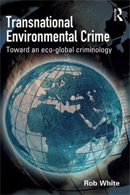Transnational Environmental Crime: Toward an Eco-global Criminology

Author: Rob White
New York, NY: Routledge, 2011. 192p.
William D. Moreto | January 2012
Extending his prior work concerning green criminology and crimes against the environment, Rob White in this book introduces a conceptual framework and methodology based on an eco-global criminology perspective to address different forms of transnational environmental crimes and harms. Akin to his previous work, White incorporates a multi-disciplinary approach effectively recognizing the need to provide the reader with an ecological, socio-political and economic perspective without sacrificing his own criminological position. As defined by White, eco-global criminology is an approach guided by ecological concerns to address crimes and harms that are global in scope. Although relatively brief, the book is extremely dense, and a wide range of issues are covered including climate change, biodiversity and pollution. White also discusses topics traditionally found in the criminological literature, including chapters on the perpetrators of environmental crimes and criminal justice responses — all the while contextualizing his discussions by incorporating various geographical, socio-political, and cultural viewpoints.
As in his previous work, White emphasizes the need to distinguish between environmental crimes as outlined by legal systems and various forms of environmental harms, particularly those with widespread global implications. As a result, he is able to outline various harms that impact not only humans but also non-human species and the surrounding environment — thus effectively expanding the scope of eco-global criminology beyond the narrow legal definitions. Additionally, a central underlying theme that can be found throughout the book is that nearly everything in the world is interconnected. Such focus on the interconnected nature of our world is explicit in the ecological literature, and the author does not disappoint in mentioning it early and often. Utilizing such a platform, White is able to highlight the role that criminologists can have in addressing environmental crimes and harms that extend beyond traditional criminological research.
White admirably defines and explains many of the key topics he puts forth, but grapples with the complex reality resulting from the ambiguity and subjectivity associated with many topics in the green criminology and ecological literature. The reader, regardless of academic training or professional background, will walk away with a firm grasp of the historical and current state of ecological and environmental crime, green criminology and eco-global criminology. The author approaches his most recent entry from a similar critical perspective found in his earlier work — an approach typically taken by those interested in green criminology. While more conventional criminologists may be put off by such critical undertones, White does an excellent job of satisfying most readers by presenting his arguments from multiple angles, including those found in more conventional criminological circles.
In general, Rob White offers a compelling argument for the use of an eco-global criminology framework to investigate and understand transnational environmental crimes and harms. By providing a coherent analytical framework supported by thought-provoking and relevant examples of environmental crimes and harms, he presents an approach that could potentially have an immediate impact on how such crimes and harms are effectively understood and addressed.
William D. Moreto is a Doctoral Student at Rutgers University School of Criminal Justice.


